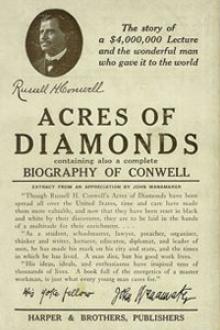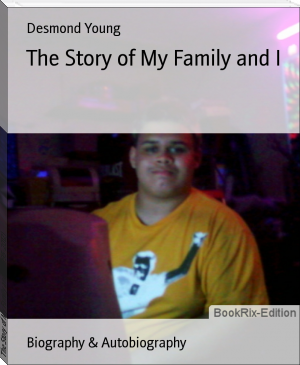Acres of Diamonds - Russell H. Conwell (big screen ebook reader .txt) 📗

- Author: Russell H. Conwell
- Performer: 1599869802
Book online «Acres of Diamonds - Russell H. Conwell (big screen ebook reader .txt) 📗». Author Russell H. Conwell
He is the most popular lecturer in the world and yearly speaks to many thousands. He is, so to speak, the discoverer of “Acres of Diamonds,”
through which thousands of men and women have achieved success out of failure. He is the head of two hospitals, one of them founded by himself, that have cared for a host of patients, both the poor and the rich, irrespective of race or creed.
He is the founder and head of a university that has already had tens of thousands of students.
His home is in Philadelphia; but he is known in every corner of every state in the Union, and everywhere he has hosts of friends. All of his life he has helped and inspired others.
Quite by chance, and only yesterday, literally yesterday and by chance, and with no thought at the moment of Conwell although he had been much in my mind for some time past, I picked up a thin little book of description by William Dean Howells, and, turning the pages of a chapter on Lexington, old Lexington of the Revolution, written, so Howells had set down, in 1882, I noticed, after he had written of the town itself, and of the long-past fight there, and of the present-day aspect, that he mentioned the church life of the place and remarked on the striking advances made by the Baptists, who had lately, as he expressed it, been reconstituted out of very perishing fragments and made strong and flourishing, under the ministrations of a lay preacher, formerly a colonel in the Union army. And it was only a few days before I chanced upon this description that Dr. Conwell, the former colonel and former lay preacher, had told me of his experiences in that little old Revolutionary town.
Howells went on to say that, so he was told, the colonel’s success was principally due to his making the church attractive to young people.
Howells says no more of him; apparently he did not go to hear him; and one wonders if he has ever associated that lay preacher of Lexington with the famous Russell H. Conwell of these recent years!
“Attractive to young people.” Yes, one can recognize that to-day, just as it was recognized in Lexington. And it may be added that he at the same time attracts older people, too! In this, indeed, lies his power. He makes his church interesting, his sermons interesting, his lectures interesting. He is himself interesting! Because of his being interesting, he gains attention. The attention gained, he inspires.
Biography is more than dates. Dates, after all, are but mile-stones along the road of life. And the most important fact of Conwell’s life is that he lived to be eighty-two, working sixteen hours every day for the good of his fellow-men. He was born on February 15, 1843—born of poor parents, in a low-roofed cottage in the eastern Berkshires, in Massachusetts.
“I was born in this room,” he said to me, simply, as we sat together recently[3] in front of the old fireplace in the principal room of the little cottage; for he has bought back the rocky farm of his father, and has retained and restored the little old home. “I was born in this room. It was bedroom and kitchen. It was poverty.” And his voice sank with a kind of grimness into silence.
[3] This interview took place at the old Conwell farm in the summer of 1915.
Then he spoke a little of the struggles of those long-past years; and we went out on the porch, as the evening shadows fell, and looked out over the valley and stream and hills of his youth, and he told of his grandmother, and of a young Marylander who had come to the region on a visit; it was a tale of the impetuous love of those two, of rash marriage, of the interference of parents, of the fierce rivalry of another suitor, of an attack on the Marylander’s life, of passionate hastiness, of unforgivable words, of separation, of lifelong sorrow. “Why does grandmother cry so often?”
he remembers asking when he was a little boy.
And he was told that it was for the husband of her youth.
We went back into the little house, and he showed me the room in which he first saw John Brown. “I came down early one morning, and saw a huge, hairy man sprawled upon the bed there—and I was frightened,” he says.
But John Brown did not long frighten him!
For he was much at their house after that, and was so friendly with Russell and his brother that there was no chance for awe; and it gives a curious side-light on the character of the stern abolitionist that he actually, with infinite patience, taught the old horse of the Conwells to go home alone with the wagon after leaving the boys at school, a mile or more away, and at school-closing time to trot gently off for them without a driver when merely faced in that direction and told to go! Conwell remembers how John Brown, in training it, used patiently to walk beside the horse, and control its going and its turnings, until it was quite ready to go and turn entirely by itself.
The Conwell house was a station on the Underground Railway, and Russell Conwell remembers, when a lad, seeing the escaping slaves that his father had driven across country and temporarily hidden. “Those were heroic days,” he says, quietly. “And once in a while my father let me go with him. They were wonderful night drives—
the cowering slaves, the darkness of the road, the caution and the silence and dread of it all.”
This underground route, he remembers, was from Philadelphia to New Haven, thence to Springfield, where Conwell’s father would take his charge, and onward to Bellows Falls and Canada.
Conwell tells, too, of meeting Frederick Douglass, the colored orator, in that little cottage in the hills. “ `I never saw my father,’ Douglass said one day—his father was a white man—`and I remember little of my mother except that once she tried to keep an overseer from whipping me, and the lash cut across her own face, and her blood fell over me.’
“When John Brown was captured,” Conwell went on, “my father tried to sell this place to get a little money to send to help his defense.
But he couldn’t sell it, and on the day of the execu-tion we knelt solemnly here, from eleven to twelve, just praying, praying in silence for the passing soul of John Brown. And as we prayed we knew that others were also praying, for a church-bell tolled during that entire hour, and its awesome boom went sadly sounding over these hills.”
Conwell believes that his real life dates from a happening of the time of the Civil War—a happening that still looms vivid and intense before him, and which undoubtedly did deepen and strengthen his strong and deep nature. Yet the real Conwell was always essentially the same.
Neighborhood tradition still tells of his bravery as a boy and a youth, of his reckless coasting, his skill as a swimmer and his saving of lives, his strength and endurance, his plunging out into the darkness of a wild winter night to save a neighbor’s cattle. His soldiers came home with tales of his devotion to them, and of how he shared his rations and his blankets and bravely risked his life; of how he crept off into a swamp, at imminent peril, to rescue one of his men lost or mired there. The present Conwell was always Conwell; in fact, he may be traced through his ancestry, too, for in him are the sturdy virtues, the bravery, the grim determination, the practicality, of his father; and romanticism, that comes from his grandmother; and the dreamy qualities of his mother, who, practical and hardworking New England woman that she was, was at the same time influenced by an almost startling mysticism.
And Conwell himself is a dreamer: first of all he is a dreamer; it is the most important fact in regard to him! It is because he is a dreamer and visualizes his dreams that he can plan the great things that to other men would seem impossibilities; and then his intensely practical side his intense efficiency, his power, his skill, his patience, his fine earnestness, his mastery over others, develop his dreams into realities.
He dreams dreams and sees visions—but his visions are never visionary and his dreams become facts.
The rocky hills which meant a dogged struggle for very existence, the fugitive slaves, John Brown —what a school for youth! And the literal school was a tiny one-room school-house where young Conwell came under the care of a teacher who realized the boy’s unusual capabilities and was able to give him broad and unusual help. Then a wise country preacher also recognized the unusual, and urged the parents to give still more education, whereupon supreme effort was made and young Russell was sent to Wilbraham Academy.
He likes to tell of his life there, and of the hardships, of which he makes light; and of the joy with which week-end pies and cakes were received from home!
He tells of how he went out on the roads selling books from house to house, and of how eagerly he devoured the contents of the sample books that he carried. “They were a foundation of learning for me,” he says, soberly. “And they gave me a broad idea of the world.”
He went to Yale in 1860, but the outbreak of the war interfered with college, and he enlisted in 1861. But he was only eighteen, and his father objected, and he went back to Yale. But next year he again enlisted, and men of his Berkshire neighborhood, likewise enlisting, insisted that he be their captain; and Governor Andrews, appealed to, consented to commission the nineteen-year-old youth who was so evidently a natural leader; and the men gave freely of their scant money to get for him a sword, all gay and splendid with gilt, and upon the sword was the declaration in stately Latin that, “True friendship is eternal.”
And with that sword is associated the most vivid, the most momentous experience of Russell Conwell’s life.
That sword hangs at the head of Conwell’s bed in his home in Philadelphia. Man of peace that he is, and minister of peace, that symbol of war has for over half a century been of infinite importance to him.
He told me the story as we stood together before that sword. And as he told the story, speaking with quiet repression, but seeing it all and living it all just as vividly as if it had occurred but yesterday, “That sword has meant so much to me,”
he murmured; and then he began the tale: “A boy up there in the Berkshires, a neighbor’s son, was John Ring; I call him a boy, for we all called him a boy, and we looked upon him as a boy, for he was under-sized and under-developed—
so much so that he could not enlist.
“But for some reason he was devoted to me, and he not only wanted to enlist, but he also wanted to be in the artillery company of which I was captain; and I





Comments (0)